Most of the University of Hawaii’s more than 200 executives are eligible for merit-based raises totaling approximately $800,000 under criteria approved Thursday by a Board of Regents committee.
University of Hawaii President David Lassner on Sept. 1 proposed using annual performance evaluation ratings to expend $1.1 million available this year for salary adjustments for the university’s 252 executive and managerial employees.
The positions are excluded from collective bargaining but attached to the bargaining unit representing faculty, and include vice presidents and associate vice presidents, chancellors and vice chancellors, deans, associate deans and program directors.
The funds were appropriated specifically for salary adjustments for these excluded employees, and any unused money would be returned to the state general fund, UH officials said.
“This is not coming out of tuition increases or any fees generated by the University of Hawaii,” university spokesman Dan Meisenzahl said Thursday.
Instead of across-the-board increases for the group, Lassner sought tiered increases tied to each employee’s annual evaluation rating. There are four possible ratings — outstanding, superior, satisfactory and less than satisfactory — on the annual evaluations, which include reviews from supervisors, self-assessments and anonymous feedback from peers and subordinates.
Under the guidelines approved Thursday by the regents’ Personnel Affairs Committee, those rated satisfactory or higher would receive a $2,000 boost to their base salary; those rated superior would get an additional 1 percent increase; and employees rated outstanding would receive another 2 percent raise. Anyone rated less than satisfactory would not be eligible for a raise.
“In the aggregate, this methodology results in an overall average increase of approximately 3.5 percent, subject to variation based on performance and internal equity,” Lassner wrote Sept. 1 in a memorandum to regents Chairwoman Jan Sullivan.
“That’s the intent of the administration, to reward or to acknowledge meritorious performance,” Jan Gouveia, system vice president for administration, told the committee. “It is not an across-the-board, which is what was done with their counterparts.”
The faculty union, the University of Hawaii Professional Assembly, negotiated across-the-board 4 percent annual raises in its 2015-17 contract. Meanwhile, an arbitration panel late last year awarded 4 percent annual raises and a one-time $2,500 bonus for administrative, professional and technical — or APT — employees at UH, who are covered by the Hawaii Government Employees Association.
Meisenzahl said UH is still determining how many executives fall into the various categories for the tiered raises, but said that most would be eligible for an adjustment. Still, some employees might follow the lead of the senior management and decline their increases, as some deans have in past years.
“Not everyone is getting a salary adjustment,” Meisenzahl said. “You have to have earned it. But the final numbers are still a little fluid at this point.”
Gouveia said members of the senior management team — the seven system vice presidents and the three chancellors of the four-year campuses — have chosen to follow Lassner’s lead and forgo any potential salary increases. (Regents recently gave Lassner a positive evaluation but at his request did not consider a salary adjustment. Lassner, who earns $375,000 as president, made the same request last year.)
Regent Randy Moore, co-vice chairman of the board, said he was concerned by the move.
“As to the officers’ willingness to forgo their increases, I’m very impressed, No. 1,” Moore said. “No. 2, actually, I’m slightly concerned, because most of those folks are at the very low end of their salary ranges. … While it’s commendable that people are willing to work for what some would argue is a submarket rate, in the long run that’s probably not a sustainable proposition.”
With those executives taken out, Gouveia said, the increases altogether could cost somewhere between $750,000 and $800,000.
With the methodology approved, the university will finalize individual raise amounts and seek approval later this month from the full board for employees who report directly to the Board of Regents or the president. Under board policy, salary adjustments for other executives would not require board approval.
If approved, the increases would be retroactive to July 1.
Last year UH paid out approximately $1 million in raises for 182 of the 221 executive and managerial employees on payroll at the time. Those increases represented the first raises in seven years for the group.

